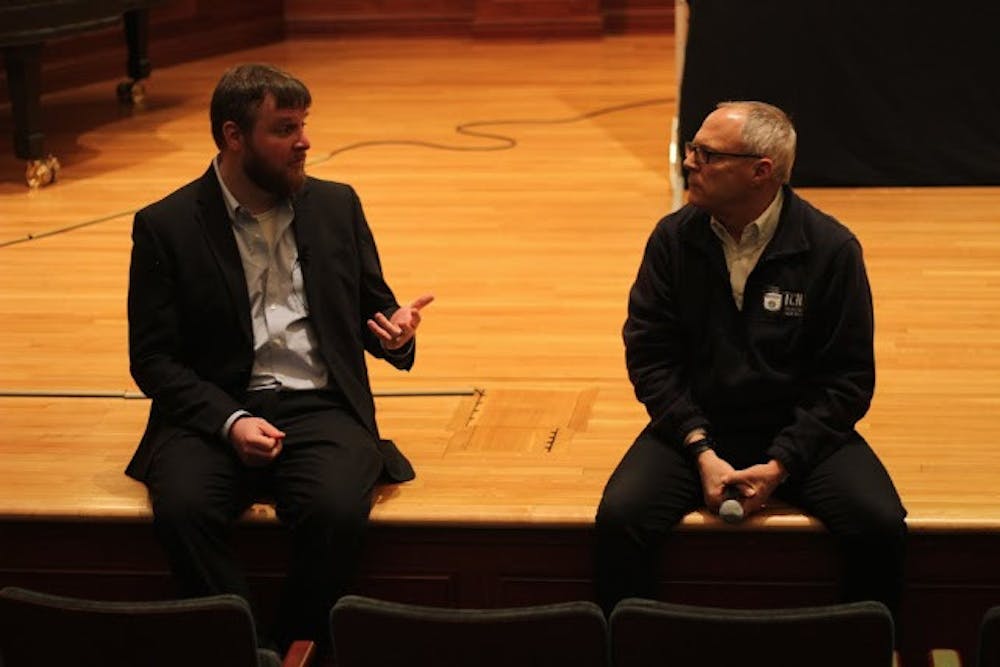By Frank Festa
Staff Writer
This semester’s inaugural lecture of the College’s Brown Bag Series proved to be an enthralling event, as the guest speaker addressed an increasingly relevant topic of discussion — the dependency we now have on computer-mediated mediums for interpersonal communication.
Andrew C. High of the University of Iowa expressed his developed hypotheses on how this preference can both help and hinder communication, during a lecture in the Mayo Concert Hall on Friday, Feb. 6, entitled “Computer-Mediated Communication: Exploring the Interpersonal Problems and Benefits of Online Interactions.” High noted early and often how applicable his research was to each and every one of us.
“This is probably near and dear to all of us — because it’s such a big part of our lives, we hardly recognize or acknowledge it,” High said. “Ninety million Americans are portrayed on some type of online group or community.”
Computer-Mediated Communication, which High abbreviated as CMC, entails any sort of interaction that may take place in cyberspace, whether on Facebook, Twitter or even ChristianMingle.
Theoretically, High believes that we have moved away from face-to-face interaction in favor of the comfort distance provides.
“People often tend to prefer CMC when their own desired impressions are threatened — it provides them a space to communicate things differently than they would otherwise,” High said. “If I wanted to break up with you, we’re going to have to have a long conversation. It might get sad and you may even punch me.”
His sarcastic tone was greeted with laughter from the audience, but he did have a point — there was no arguing that difficult conversations were easier to have via CMC.
High set out to discover if CMC had realistically surpassed face-to-face communication in terms of emotional discourse. In order to begin this process, he completed four studies in which he conducted research on the different ways people utilize CMC as a method of seeking support and expressing emotion. His methodology was varied in a way that could put issues big and small in perspective, making use of various diverse groups.
He sought answers to those questioning whether or not face-to-face communication was preferred to online when seeking support and how gender may contribute to variation. He even went as far as analyzing how a military support group of 19,000 members interact.
One study in particular sought to determine if Facebook is an effective context for supportive communication, something High believes to be essential.

“It allows us to cope better, express ourselves and ultimately reduce and help manage stress better,” High said.
The results of the studies varied in result as one could expect, but it was clear enough to come to certain conclusions — that CMC is preferred for supportive communication, that the large military support group was effective and that Facebook could be a constructive place for support to take place.
And yet on this last conclusion, there were some discrepancies.
“What most surprised me was that support being provided went down when somebody was actually seeking it out, which was kind of disheartening,” High said.
While plenty of negative effects may result from CMC in atmospheres such as Facebook and Twitter, High refuses to discredit it completely. The web in general connects people in ways that were once unimaginable. Communities are established where like-minded individuals or those in need of support are free to interact.
“Support groups are wonderful because they are anonymous and connect you to people with similar experiences,” High said.
Lorna Johnson-Frizell, associate professor of communications at the College, supported High in this regard and praised Facebook for assisting her search on parenting advice.
“It collapses time and collapses geography,” Johnson-Frizell said. “Without Facebook, I’d have to meet each of these people face to face.”
Of all that could be said of CMC, there is no omitting the fact that it will become only more ingrained in us, constituting an even bigger part of our communication.
“During my speech, 13,850,000 new users or profiles joined Facebook,” High said “There has been 300 million page views just while I’ve been talking. Facebook is the most heavily trafficked website.”
Moving forward, High would like to continue this kind of research on the effects of CMC through whichever methods made available. He also plans to analyze a group of elderly cancer patients in the near future with help from the hospital at The University of Iowa. For the time being, he will focus on building upon the studies he’s already conducted.

“We actively try to collect Facebook posts to see how support takes form and to seek out instances in which perception differs,” High said.
Facebook has become his most reliable point of reference, but common ideology would lead one to believe that an even more personal network, such as texting or instant messaging, would be a better place to extract real emotions.
Unfortunately, it isn’t ever that simple.
“Texting is trickier to study because nobody is willing to give us access to their texts, which we understand,” High said. “Besides, we aren’t really interested in what your plans are for spring break.”







